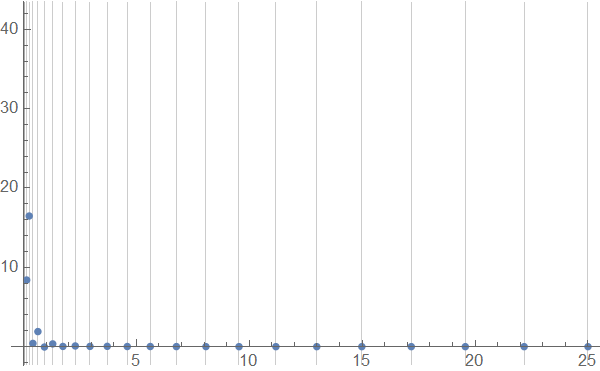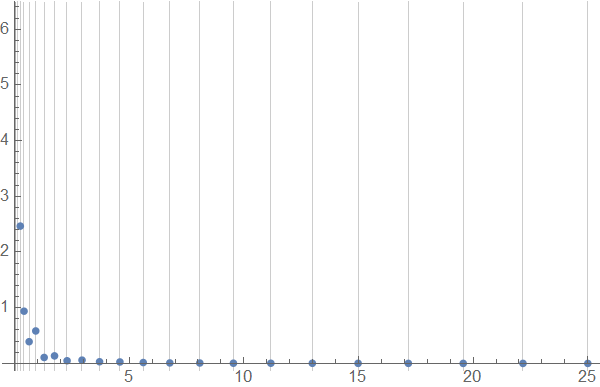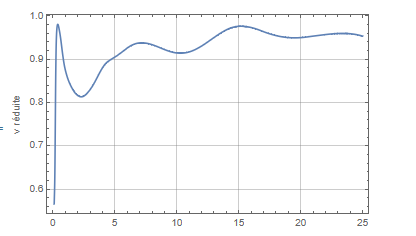dataset should include point R=0. That's why I added point {0,0}.
With the transformed integralequation v[R]^2=Integrate[...,{s,0,e}]
the solution evaluates.
e = 0.995;
v = Interpolation[{{0, 0}, {0.1, 0.566016}, {0.11, 0.575781}, {0.121,
0.5875}, {0.133, 0.600781}, {0.146, 0.620703}, {0.161,
0.653906}, {0.177, 0.703516}, {0.195, 0.767969}, {0.214,
0.834375}, {0.236, 0.889844}, {0.259, 0.929297}, {0.285,
0.954688}, {0.314, 0.969531}, {0.345, 0.977344}, {0.38,
0.980469}, {0.418, 0.979297}, {0.459, 0.975391}, {0.505,
0.96875}, {0.556, 0.960547}, {0.612, 0.95}, {0.673,
0.936719}, {0.74, 0.921094}, {0.814, 0.905078}, {0.895,
0.889844}, {0.985, 0.876953}, {1.083, 0.866016}, {1.192,
0.855859}, {1.311, 0.846875}, {1.442, 0.838672}, {1.586,
0.830859}, {1.745, 0.823828}, {1.919, 0.818359}, {2.111,
0.814453}, {2.323, 0.813281}, {2.555, 0.816016}, {2.81,
0.823047}, {3.091, 0.833594}, {3.4, 0.848438}, {3.74,
0.867188}, {4.114, 0.885156}, {4.526, 0.896484}, {4.979,
0.904688}, {5.476, 0.914453}, {6.024, 0.926563}, {6.626,
0.935547}, {7.289, 0.937891}, {8.018, 0.933594}, {8.82,
0.924609}, {9.702, 0.916016}, {10.672, 0.914844}, {11.739,
0.926172}, {12.913, 0.948438}, {14.204, 0.970703}, {15.625,
0.975391}, {17.187, 0.961719}, {18.906, 0.950391}, {20.797,
0.952734}, {22.876, 0.959375}, {25.164, 0.951953}}
];
Rmin = 0; Rmax = 25;
ni = 25;
FEM approach:
Needs["NDSolve`FEM`"]
riGrid[n_] :=
Block[{dt, \[CapitalDelta]t0, \[CapitalDelta]t1, zw, sol},
dt = Map[\[CapitalDelta]t0 + (\[CapitalDelta]t1 - \[CapitalDelta]t0)(#/Rmax)^2 &, Subdivide[0, Rmax, n]];
zw = Accumulate[dt];
sol = Solve[{zw[[1]] == Rmin,zw[[-1]] == Rmax},
{\[CapitalDelta]t0,\[CapitalDelta]t1}][[1]];
zw /. sol // N
]
ri = riGrid[ni];(*problem adapted grid*)
(*{0., 0.00452489, 0.0226244, 0.0633484, 0.135747, 0.248869,0.411765,0.633484, 0.923077, 1.28959, 1.74208, 2.28959,2.94118, 3.70588, 4.59276, 5.61086, 6.76923, 8.07692, 9.54299, 11.1765,12.9864,14.9819, 17.1719, 19.5656, 22.1719, 25.}*)
\[Rho]i =Table[\[Rho][k], {k, 1, Length[ri]}];
netz = ToElementMesh[Map[{#} &, ri]];
\[Phi]i =Map[ElementMeshInterpolation[netz, #]&,IdentityMatrix[Length[ri]]];
Plot[Evaluate[Through[\[Phi]i[R]]], {R, Rmin, Rmax}];
int[R_?NumericQ] :=Block[{ },v[R]^2 - 4 Pi R^2 Sqrt[1 - e^2]/e^3
NIntegrate[
s^2/Sqrt[1 - s^2] Through[\[Phi]i[s R/e]], {s, 0, e},
Method -> {"FiniteElement", "LocalAdaptive"}[[1]]] . \[Rho]i]
zwint = Table[int[R], {R, ri}] /. 0. -> 0 // Quiet;
mini0 = NMinimize[zwint . zwint, \[Rho]i]
(*{-1.73472*10^-18, {\[Rho][1] -> 0.0352952, \[Rho][2] -> 0.206768, \[Rho][3] -> 0.170064, \[Rho][4] -> 0.178969, \[Rho][5] -> 0.171873,
\[Rho][6] ->
0.161654, \[Rho][7] -> 0.138237, \[Rho][8] -> 0.10491, \[Rho][9] ->
0.0706109, \[Rho][10] -> 0.0444486, \[Rho][11] ->
0.0275268, \[Rho][12] -> 0.0172977, \[Rho][13] ->
0.0111636, \[Rho][14] -> 0.0074253, \[Rho][15] ->
0.00507642, \[Rho][16] -> 0.00356313, \[Rho][17] ->
0.00255434, \[Rho][18] -> 0.00187092, \[Rho][19] ->
0.00139474, \[Rho][20] -> 0.0010538, \[Rho][21] ->
0.000810122, \[Rho][22] -> 0.000628789, \[Rho][23] ->
0.000496635, \[Rho][24] -> 0.000392479, \[Rho][25] ->
0.000317462, \[Rho][26] -> 0.000254499}}*)
ListPlot[ Transpose[{ri, \[Rho]i} /. mini0[[2]]],GridLines -> {ri,None}]

Interpolation&Gaussian quadrature :
swGauss =GaussianQuadratureWeights[ 15, 0, e] ;
JJ = Sum[{1, 1/(1 + (R/2)^4) }[[-1]]
(v[R]^2 -4 Pi R^2 Sqrt[1 - e^2]/e^3
Total@Map[#[[2]] #[[1]]^2 /Sqrt[1 - #[[1]]^2]Interpolation[Transpose[{Rationalize[ri], \[Rho]i}]][#[[1]]R/e] & ,swGauss] )^2, {R, ri}];
mini00 = NMinimize[{JJ ,Map[# > 0 &, \[Rho]i] }, \[Rho]i]
ListPlot[Rest@Transpose[{ri, \[Rho]i} /. mini00[[2]]],GridLines -> {ri, None}]





R=0! $\endgroup$v[R]^2/(4Pi R^2)must be finite for all values of R. $\endgroup$vc, which part are you having difficulty? (Of course you need to supplement the missing data atR==0. ) $\endgroup$vc[R]should be update. $\endgroup$